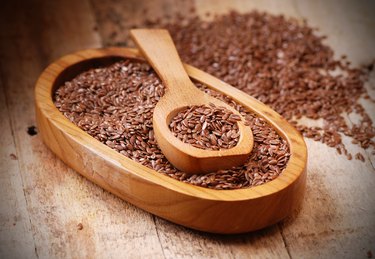
Flax meal is a dietary supplement that contains both fiber and omega-3 fatty acids. Raw flax, however, may also contain an unwanted ingredient: cyanide. While most flaxseed supplements are safe, taking flax the wrong way can increase your blood cyanide levels. Learning what to watch for and talking to your doctor before taking flax can help keep you safe.
Flax Meal
Video of the Day
Flax meal is the term for the ground seeds of the linum, or flax, plant. Flax meal is a dietary supplement that you can add to food or drinks. Flaxseed is approximately one-quarter fiber, and one-quarter omega-3 fatty acids, according to the US Food and Drug Administration. The other two quarters are made up of carbohydrates and proteins. Ground flaxseed, or flax meal, can be added to soft foods like applesauce or smoothies. They can not only improve bowel regularity, but may also play a role in heart health and cholesterol level management. Omega-3 fatty acids like those found in flax meal can lower triglyceride levels and may improve heart health after a heart attack, according to MayoClinic.com, though more research is needed before any definite claims can be made.
Video of the Day
Cyanide
Cyanide is a poison. It acts quickly and can be deadly, according to the Centers for Disease Control and Prevention. However, cyanide is used in the manufacturing process for many products, including plastics and photo prints. Cyanide is not uncommon in the environment, though it can cause health problems if you are directly exposed. Exposure to cyanide gas or to food products that contain cyanide may cause a sudden rapid heartbeat, nausea, headache, dizziness and difficulty breathing. According to the CDC, even small amounts of the chemical can cause symptoms within minutes. Exposure to larger amounts of cyanide may cause more severe symptoms, including loss of consciousness and respiratory distress or failure.
The Cyanide-Flax Link
There is a link between cyanide and flax; however, the dangerous chemical is not likely to be found in the supplement aisle of your supermarket. Flax meal made from ripe flaxseed is considered safe for most people, according to the FDA. However, MayoClinic.com reports that raw flaxseed and other parts of the flax plant can increase the level of cyanide in your blood. Flaxseed contains a substance called cyanogenic glycoside, which forms hydrogen cyanide when the seeds are crushed in water. However, the FDA reports that most manufacturing processes wash this type of cyanide away. In addition, MayoClinic.com reports that no adverse cyanide-related effects have been reported after taking flax supplements within the daily recommended maximums.
Safety
Always talk to your doctor before trying any new supplement, including flax meal. Never take seeds directly from a flax plant and do not ingest any other part of the flax plant. While some manufacturers may advise different flax meal dosages, the FDA recommends taking no more than 16 grams of flaxseed or flax meal daily to avoid any adverse effects.